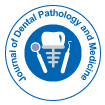开放获取期刊获得更多读者和引用
700 种期刊 和 15,000,000 名读者 每份期刊 获得 25,000 多名读者
抽象的
Oral Inflammatory Diseases Impact on Atrial Fibrillation: A Comprehensive Review
Patricia Tang
Atrial fibrillation (AF) is a prevalent cardiac arrhythmia associated with a heightened risk of severe cardiovascular complications. While traditional risk factors have been well-established, there is growing evidence to suggest that oral inflammatory diseases may contribute significantly to AF development and progression. This comprehensive review explores the intricate connection between oral inflammatory diseases and AF, highlighting potential mechanisms and clinical implications.
The oral cavity hosts a diverse microbiome and inflammatory conditions such as periodontal disease and gingivitis, among others. These conditions can release pro-inflammatory mediators, bacterial toxins, and elicit immune responses that may affect remote organs and systems, including the cardiovascular system.
Inflammation, a recognized player in cardiovascular diseases, is believed to contribute to AF by promoting atrial inflammation and fibrosis, affecting the myocardium and conduction system, ultimately leading to electrical and structural remodeling. Potential mechanisms encompass the release of inflammatory mediators, endothelial dysfunction, microbiota dysbiosis, and autonomic nervous system activation.
Recognizing the interplay between oral health and AF holds clinical significance. Collaboration between dentists and cardiologists for at-risk patient identification and integrated care plans is crucial. For AF patients, maintaining good oral health may serve as an adjunctive strategy to reduce the risk of AF recurrence and associated complications.
In conclusion, the association between oral inflammatory diseases and AF represents a promising avenue for understanding the multifactorial nature of this cardiac arrhythmia. While further research is required to establish causality and precise mechanisms, the evidence suggests that oral health is not merely confined to dental care but extends to cardiovascular well-being. Acknowledging this intricate relationship between oral and cardiac health paves the way for more holistic patient care and novel approaches to AF prevention and management. Additional studies are needed to validate the clinical utility of addressing oral inflammatory diseases in AF prevention and treatment strategies.

 English
English  Spanish
Spanish  Russian
Russian  German
German  French
French  Japanese
Japanese  Portuguese
Portuguese  Hindi
Hindi